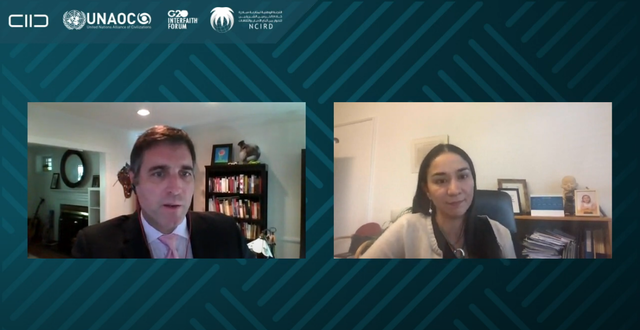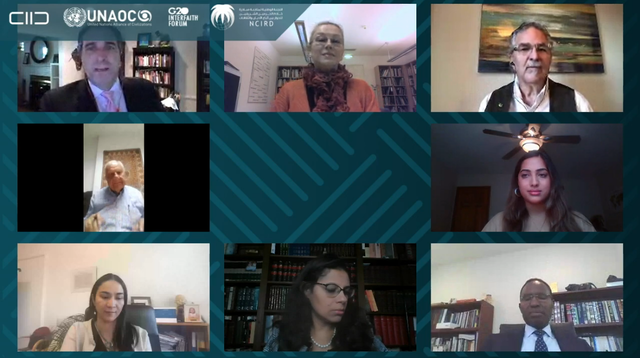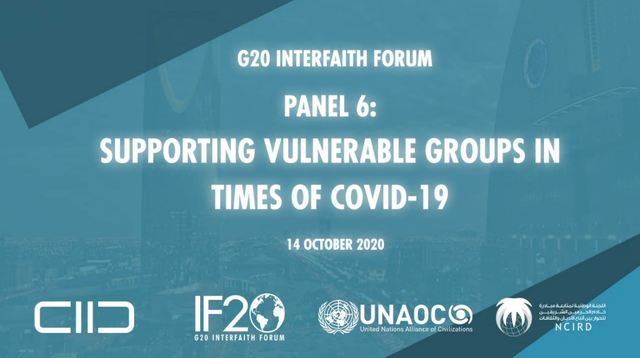The G20 interfaith forum is an annually held event that seeks to build on the vital roles that religious institutions and beliefs play in shaping the world we live in. Given the current restrictions, the summit was held online in October 2020.
The Forum and was organized in conjunction with the G20 Interfaith Forum Association, The International Dialogue Centre (KAICIID), the United Nations Alliance of Civilizations (UNAOC) and the National Committee for Interfaith and Intercultural Dialogue (NCIRD) in the Kingdom of Saudi Arabia. It saw 147 speakers and panelists representing 47 countries participate in the four-day summit. Arigatou International Geneva was honored to partake in the event with Ms. Maria Lucia Uribe, its Executive Director, being invited to speak on a panel discussion on Vulnerable Groups in Times of COVID-19 during the G20 Interfaith Forum.
During the workshop, Ms. Uribe spoke about the importance of transitioning from vulnerability to resilience. During her introductory remarks she pointed out that “thinking of people as vulnerable can be tricky. As it makes us focus on a deficit approach that conceives of individuals […] as powerless”. She noted that despite being characterized as ancillary actors during the COVID-19 pandemic, given their relatively low-level risks from the virus, children have had their lives radically altered with many adverse effects as a result of this.
Ms. Uribe put forth three lenses with which we may be able to better reimagine the role of children during this pandemic so they are not considered merely a vulnerable group and in doing so change the discourse surrounding them but also the actions and responses of governments.

The first lens dealt with understanding the virus not as endemic but rather situated within a broader context which took into account political and socio-economic realities faced by people within communities. Inequality, lack of medical and educational services, as well as food insecurity are all pre-existing conditions whose effects have only been highlighted with the presence of this pandemic.
Secondly, we must examine the shift from vulnerability to building resilience. Ms. Uribe highlighted the value in shifting this mental framework as a means of fostering a sense of inclusivity among children. By fostering this sense of resilience we can help children and young people see themselves, not as part of the problem, but rather as agents of change capable of participating in tangible civic and social actions towards improving their communities.
Finally, Ms. Uribe noted that pandemics such as this one increase fear among a population. It is within this fear that we find fertile soil in which racism and xenophobia can take root. To alter the discourse around vulnerable groups and mitigate the proliferation of racism and xenophobia we need to, as Ms. Uribe so succinctly puts it, “develop community-based approaches where beneficiaries of interventions, particularly children and young people, take leadership, support each other and are key partners in developing strategies […] Helping to challenge their view as vulnerable and powerless to transform their perception of them and their involvement”.

Ms. Uribe also collaborated with other participants of the G20 Interfaith Forum in putting together a Policy Brief which included a Call to Action “for G20 governments and their development partners to forge cross-boundary collaboration to jointly advance an agenda of inclusive education.” (pg 22, A G20 Interfaith Forum Policy Brief, 2020) The policy briefing noted three areas of priority for policy recommendations and actions, with each area containing three additional more specific and relevant recommendations. The first area of note was advancing wellbeing as the central aim/purpose of education. The guiding principle in this instance being that approaches to the curriculum should focus on wellbeing as their primary goal. Secondly, was the essential area which was ensuring participation of all in inclusive learning environments. The pandemic has brought to light the disconnect between schooling and the non-formal sectors of education such as the home or the community. A shift towards an eco-system in which all stakeholders – students, teachers, parents, and communities – are engaged is essential moving into the post-COVID world. Finally, we have the aligning of teachers’ professional development with a wellbeing and inclusion focus. Ensuring that training for education professionals embodies a focus on children’s wellbeing will be an essential step moving forward.
It was our great privilege to have been involved in such an event and to affiliate ourselves with the creation of such an inspiring call to action. We would like to thank the G20 Interfaith Forum Association and all its partners for providing us with this opportunity.
The workshop can be watched here and the final report can be accessed here.
